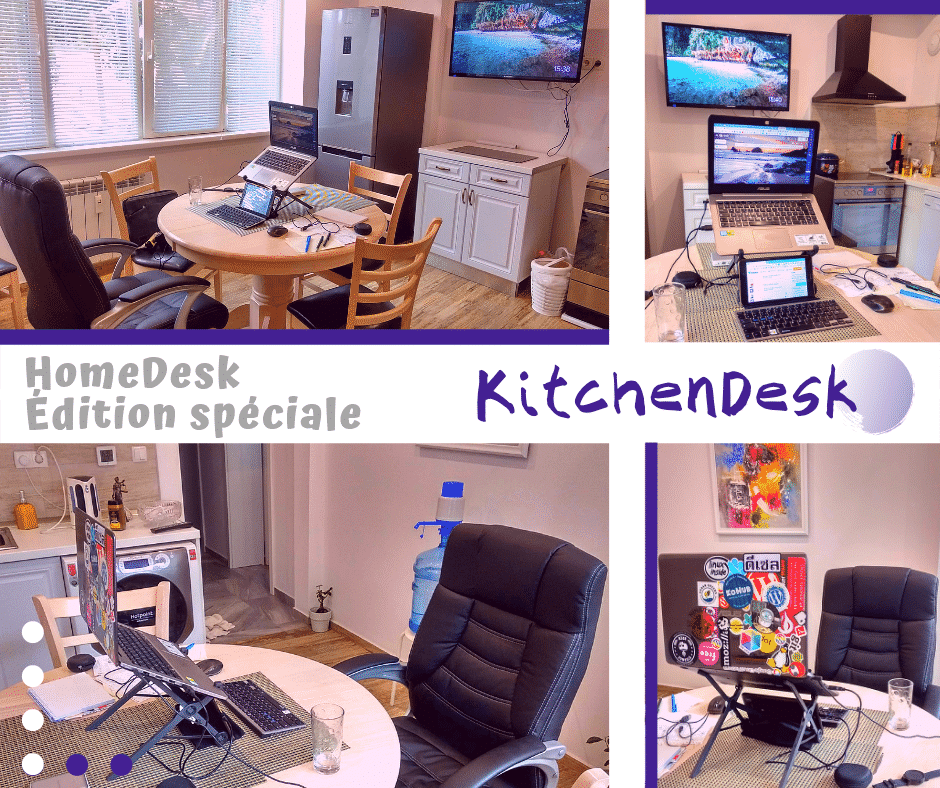Test the digital nomad lifestyle?
I was comfortably settled as an employee in the office of my career until the summer of 2017. I had reached the limit of what I could sacrifice to pursue a traditional career.
Primarily my work weighed heavily on my mood and the benefits no longer outweighed the disadvantages. It was not so much linked to a particular company but the employee status in general.
If you are interested in this, I invite you to take a look at this article on the excellent French site, pose ta dem’ (quit your job); I had been interviewed at that time – Pose ta dem’ Article (Only in French).
So I decided to start my activities as a freelance worker and I also learned during the preparation of this transition that another way of life is possible: being freelance and traveling at the same time. All the nomadic freelancers who communicate on social networks showed that it was possible.
The traveler’s instinct had awakened in me.
I sold or gave away almost everything I owned, left my apartment; I was ready for a new life.
How to manage your business activities under these conditions?
Obviously working entirely remotely requires adaptations to your mode of operation.
However, there are constants; your clients / employers expect you to deliver results on time. I would say that in general if you are starting out with new clients / employers you will have to demonstrate that you are competent, reliable … and that they were right to hire you, which is always the case whatever the mode of collaboration.
Regarding my experience of teleworking there are at least 2 categories of clients / employers:
- Those who have worked this way in the past or who work regularly in this way and for whom this is generally not a concern.
- Those who are not familiar with this way of working, but who are open to discussion and ready to test.
We could add at least 2 others:
- Those who agree, but not 100%, IE it will be necessary to organize a meeting for the start or to plan working hours in their premises.
- Those who end the conversation as soon as the word “telework” or “remote work” is heard.
Personally I missed out on opportunities that seemed very interesting because of working remotely.
The basis of work organization
- Responsiveness, speed and efficiency in accomplishing missions.
- At the start, I opted for voluntary over-communication and over-availability in order to show my commitment in the beginning.
- Quantify work sessions (time…).
- If your location is new, the priority is to create optimal working conditions; it’s better to anticipate.
Some examples of «full remote» companies
- Automattic
- Buffer
- GitLab
- Invision
- Zapier
Here is an updated list of this month prepared by Rodolphe Dutel of remotive.io:
Many tools exist to manage all aspects of collaboration, of remote work. The Cloud, messaging apps, video chat, project management apps (I write about software / apps a little further on in this article), however, all this will only be effective if you lay the foundations for their use:
- When to use chat?
- When to use emails?
- When do we switch to the phone?
- Is the topic urgent or immediate?
- For work meetings, it’s good to know in advance: What are we going to talk about? Are there things to prepare? How long is it going to take ?
One particularly important thing in my opinion: Asynchronicity is OK !!
On the material / technical level
For my part, I had to equip myself to be able to carry my office. I bought a stand for my laptop, a Bluetooth keyboard among other things. The idea is not to make an exhaustive list but simply to highlight that your work depends on for a good part of your work tools, it may seem simplistic said like that, but you will not always be able to count on the supervision of your employer or client to meet the favorable conditions for exercise.
And most importantly, as a digital worker, access to the Internet, like the use of a mobile phone, is essential.
One may also wonder if it is better to work from home, an office or shared spaces.
Gather good work conditions
Personally, I enjoy working from home. I love coworking spaces but I find that sometimes it is too stimulating and it can affect my concentration and when I am very busy I really need to focus.
My personal recipe ➡ The 8 criteria to perform:
- Quality Internet
- Good sized desk
- Nice and bright accommodation
- Quiet neighborhood
- Cafes/restaurants that are not too far for meal breaks
- A country where it’s hot is better (fan / AC recommended)
- Appropriate computer equipment
- At times it’s cool to have coworkers, but isolation brings efficiency too sometimes
… And of course work, missions…

A few Some software / apps
These are really widely used, but there are obviously many other options.
- Video chat: Zoom, Skype, WhatsApp…
- Project Management & Collaboration: Slack, Trello, Quire…
- Cloud / Drive (Google, Amazon, Microsoft, Dropbox….)
- Scheduling: Calendly, Acuity, Doodle…
- Invoicing, Business management in France: tiime
- US version: Bonsai, And.co
Here you can get more informations about My Google Tools
Some examples of activities that can be carried out exclusively through telework / online
- Blog (& Monetization)
- Sell (and / or develop) applications
- Selling graphic products
- Freelancing
- Virtual Assistant (VA)
- E-Commerce
- Social media
- Write (content….)
- Marketing
- Teach, create courses
- …
Generally speaking, the work for employees is assigned by the company.
The travel side
My journey in Europe in 2019
I think what is essential regarding this topic is to make clearly the difference between tourism and mobility. A teleworker on the move and even abroad is not a tourist.
Personally, sometimes when I was asked questions about my lifestyle / work I said that one had to imagine that I had almost the same schedule as the one that I had in Paris for example IE busy days working and moments to do something else: sports, visits, entertainment… I gained the feeling they were disappointed to hear this.
To be honest, «Digital Nomads» work more or less, earn more or less money, a bit like everyone else in fact. 😉
Choose a destination
There are some important criteria to take into consideration, depending on the person their order of priority differs.
Here is a short list:
- Climate
- Cost of life
- Internet quality
- Food
- Sports & fitness equipment
- Local communities (DN…)
- Urban or Nature
- Close to the sea, mountains, lakes …
- Local culture
- Personal safety, tolerance…
- Timezone (Time zone)
- Conditions of stay (Visas…)
- …
With the number of teleworkers increasing sharply in recent years, a lot of business have been created around this market.
To give just one example (cited very often): nomadlist.com founded by Pieter Levels himself Digital Nomad for several years and entrepreneur.
As a result, it becomes easier to get information to prepare your trips.
Housing
In general, if you do not have a clear expatriate status which can be obtained through a company or through specific visas (Work Holiday Permits for example, student visas, business…) you will probably stay temporarily – a few weeks to a few months let’s say.
However, you have to find accommodation and unless you are staying with friends / relatives or family members, I believe that travelers choose the same solutions for many.
I’m talking about AirBnB, Booking, subletting, going through Facebook groups … There are also co-living spaces in many places more or less dedicated to this new category of workers. Keep in mind that you have to guarantee favorable living / working conditions; youth hostels as such are rarely suitable, among other things because it is often complicated to work in these places or because your equipment and personal effects are less secure. A good number of travelers report having had more trouble with other travelers (stealing) than with locals.
There are many other companies and websites dedicated to rental depending on the city / country, but from experience some traditional rental companies offer long-term (year) leases and ask for official documents that you will probably not be able to provide.
Communities / Socialization
Socialization
We are not all equal on this aspect, for some people it is rather easy to reach out to others but for some it is not always the case. But remember it is good that we are not alone in asking this question.
And there are quite a few ways for travellers and locals to meet.
- Facebook groups…
- International coworking / coliving places
- Slack …
- Apps to match travelers
Different styles of teleworkers
- The Digital Backpacker (wants to see the world)
- Digital expats (they stay longer where they travel)
- Teleworkers who work from home, but don’t travel (Employees or self-employed)
- Tourists who bring a little work (to keep in touch with the office)
- Part-time digital nomads
Find events
The classics :
- Meetup.com
- Couchsurfing
On the spot :
- Flyers at the library
- Seasonal events
- …
Wherever you live, I bet being active socially, professionally, networking is a great opportunity to get further. I wrote an article about this topic and how I used to meet people in Paris.
General considerations
For most of us, nomads or not, there are essentials; I wrote about housing and of course there are others.
If you are well organized you will probably take out medical insurance, for nomads / travelers it is a little more specific but the basic rule is foresight.
Taxation is a vast subject, both in terms of entrepreneurial activities and on an individual basis. The notion of tax residence in particular often comes up in discussions. Even if it may seem complex to manage, this is not an obstacle for the vast majority of nomads. In some cases this can lead to choosing to become resident in another country sometimes and / or to set up your business (s) abroad as well.
Obviously, overall, this way of life requires adjustments, it is useful to prepare; maybe it’s a bit like moving and changing jobs.
Hardships
- isolation
- Frequent trips = quickly find you bearings
- The preparation time for each relocation
- Manage your productivity
- Lots of organization
- Find yourself in a new place (city / country) that you don’t like at all and unfortunately cannot leave because you have made commitments (reservations, transport, etc.)
- Family situation / relationships
- Understanding local habits and life
- Too much work and not enough time to find out where we live
- …
Successes and joys
- Make friends
- Stay in touch with the people you meet (social networks, etc.)
- Living in local mode means feeling the world differently
- Unforgettable moments
- The opportunity to focus on your true self
- Be more minimalist
- What you gain is hard to quantify
- Professional advancement
- Better understand your own mode of operation in terms of productivity
- Learn to organize
- Discover cultures / discover populations
- I love public transport, I discover all kinds
- …
General notions
In the context of the global digitization of the economy, teleworking is certainly on the rise. Note however that for certain categories of workers, this is not a new form of work, salespeople, copywriters … for example, have always practiced nomadic work. Information and communication technologies (ICT) increasingly facilitate these forms of work and remote collaboration.
Benefits
For companies
- Recruit talent from everywhere
- Increase production and productivity
- Save on some expenses (premises, etc.)
- Improve the quality of life of workers / employees; this can lead to more motivation and involvement
- Reduce absenteeism and turnover
- …
For workers / employees
- Time savings (transport…)
- Better management of work time
- Better management of the relationship between personal and professional life.
- Greater autonomy in task management
- Better concentration = better productivity
- …
Also in many situations, this mode of operation mode is also eco-responsible. Less transport in general implies less pollution (surely to qualify when considering frequent flyers).
On the travel and nomadic phenomenon side, the observation is similar with the difference that a level of complexity must be added linked to international regulations concerning travel and stay abroad, taxation, corporate taxation …
And it’s useful to remember that your nationality, your passport will open or close doors for you very often. To give you an idea, these websites allow you to compare mobility opportunities according to nationalities:
In addition to these few considerations, I add 2 links to official government, French and American sites:
Télétravailler – FR
Telework – US
On the administrative side, this can be instructive.
The final word
Telework is undoubtedly on the rise; this is due to global developments in work, but also in our societies.
If we go further, probably even some work which we doubt today can be done remotely will will be done by telework (think about remote surgery by instance).
The way people balance their personal life and their professional life is their own business I would say.
Therefore, if they wish to live in another city, or in another country, why not if it poses no problem for the accomplishment of their tasks.
It may be idealistic to say so and if you think about my country by instance, France, Statistics shows remote work is really less popular than in the USA. I understand this is very often managed on a case by case basis at the moment and work regulations don’t help, especially internationally.
I believe the right to telework should be offered to any employee it the job allows so, as we know it is mainly a question of organization.



